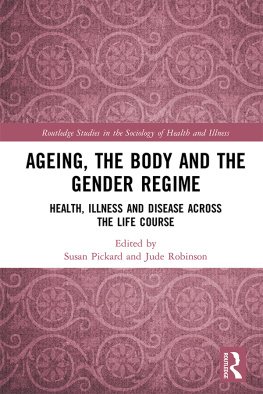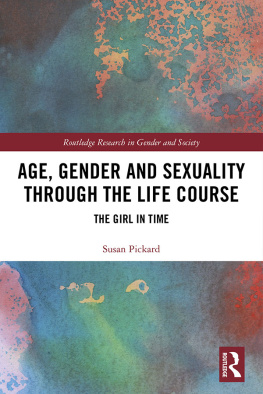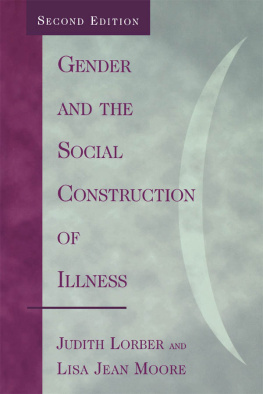Ageing, the Body and the Gender Regime
The current (postfeminist) gender order comprises a highly complex coexistence of old and new norms and expectations, freedom and constraints, within a neoliberal social order underpinned by individualism and involving a shift in gender performance by men and women.
Health, illness and disease at different points in the life course can be used as a vehicle to illuminate structural and cultural inequalities that persist despite several decades of progressive reform in western countries. This collection brings together a number of key researchers, both established and new to the field, and based across North America, Australia, the UK and Europe, and comprises both empirical and theoretical work. Drawing on a wide range of disciplinary fields, including medical sociology, medical anthropology, nursing, gender studies, sociology of risk and age studies, all authors use heath, well-being, illness and disease as a lens through which to explore the complexities and inequalities associated with late modernity.
This book will be of interest to scholars and students of age studies, medical sociology and anthropology, gender studies, healthcare and nursing.
Susan Pickard is Professor of Sociology at the Department of Sociology, Social Policy and Criminology at the University of Liverpool.
Jude Robinson is Professor in Health and Well-being at the Institute of Health and Well-being Social Sciences, University of Glasgow.
Routledge Studies in the Sociology of Health and Illness
Fertility, Health and Lone Parenting
European Contexts
Edited by Fabienne Portier-Le Cocq
Transnationalising Reproduction
Third Party Conception in a Globalised World
Edited by Risn Ryan Flood and Jenny Gunnarsson Payne
Public Health, Personal Health and Pills
Drug entanglements and pharmaceuticalised governance
Kevin Dew
Dementia as Social Experience
Valuing Life and Care
Edited by Gaynor Macdonald and Jane Mears
Injecting Bodies in More-than-Human Worlds
Mediating Drug-Body-World Relations
Fay Dennis
Contested Illness in Context
An Interdisciplinary Study in Disease Definition
Harry Quinn Schone
Banking on Milk
An Ethnography of Donor Human Milk Relations
Tanya Cassidy and Fiona Dykes
Ageing, the Body and the Gender Regime
Health, Illness and Disease Across the Life Course
Edited by Susan Pickard and Jude Robinson
For more information about this series, please visit: https://www.routledge.com/Routledge-Studies-in-the-Sociology-of-Health-and-Illness/book-series/RSSHI
First published 2020
by Routledge
2 Park Square, Milton Park, Abingdon, Oxon OX14 4RN
and by Routledge
52 Vanderbilt Avenue, New York, NY 10017
Routledge is an imprint of the Taylor & Francis Group, an informa business
2020 selection and editorial matter, Susan Pickard and Jude Robinson; individual chapters, the contributors
The right of Susan Pickard and Jude Robinson to be identified as the authors of the editorial material, and of the authors for their individual chapters, has been asserted in accordance with sections 77 and 78 of the Copyright, Designs and Patents Act 1988.
All rights reserved. No part of this book may be reprinted or reproduced or utilised in any form or by any electronic, mechanical or other means, now known or hereafter invented, including photocopying and recording, or in any information storage or retrieval system, without permission in writing from the publishers.
Trademark notice: Product or corporate names may be trademarks or registered trademarks and are used only for identification and explanation without intent to infringe.
British Library Cataloguing in Publication Data
A catalogue record for this book is available from the British Library
Library of Congress Cataloging-in-Publication Data
A catalog record has been requested for this book
ISBN: 978-1-138-35192-9 (hbk)
ISBN: 978-0-429-43495-2 (ebk)
Introduction
This book is informed by three overarching premises. The first is that, whilst the gender order in the advanced liberal nations of the global north has changed enormously since the 1970s, these changes have been uneven and have not, moreover, all been in a direction that can be described as progress. Indeed, the current (postfeminist) gender order comprises a highly complex coexistence of old and new norms and expectations, freedom and constraints, within a neoliberal social order underpinned by individualism (Fraser, 2009; McRobbie, 2009; Gill, 2007) involving a shift in gender performance by both men and, especially, women. The second premise is that a key mode through which the complexity of this order can be explored is through the lens of health, including expressions of well-being, experiences of illness and the construction of diagnostic categories (Annandale, 2009; Lewin and Olsen, 1985). At the same time, this works in the opposite direction in that the interconnection with the gender regime sheds light on the meaning of health and illness in a way that demonstrates not just the social determinants of health but also the insoluble connection between health and society, body and culture.
This is visible in two ways. Firstly, there is the emergence of illness patters and behaviours in women and men traditionally associated with the other sex. Secondly, there are expressions of somatic suffering, in individual experience and on a cultural basis (for example, through new diagnostic labels or social representations) that can then be viewed as the result of ongoing structural and cultural inequalities (not just differences) that continue to order the gender regimes in advanced liberal nations. The third and related premise is that these changes and their consequences can be explored using a life course perspective. This perspective is well equipped to display the varieties of different embodied expressions of health and illness associated with the different problems, challenges and frictions related to age, stage and the roles, relationships and norms that emerge at these points and in so doing lends a different perspective to gender. Across the life course, womens health displays multiple effects of inequality, both interwoven and cumulative. Whilst sociological explanations mostly emphasise the impact of lower income as well as cultural and environmental factors such as domestic violence and crime (Bird and Rieker, 2008), women also experience stressful role friction of various kinds at various points as their lives have become more complex than mens, taking on new roles whilst retaining old ones. This is an important aspect because as Bird and Rieker suggest, by themselves sociological approaches in terms of models of inequality and health disparities are not sufficient to address paradoxical gender differences in health (2009: 43), such as why women live longer but unhealthier lives. Meanwhile, medicine continues to problematise female bodies in a variety of ways that, inter alia, individualise the effects of structural inequalities whilst medicalising normal bodily changes, thereby profoundly affecting the way one lives and interprets ones bodiliness.
With this foundation, the chapters in this book address a lacuna, or indeed several lacunae, in the current scholarship. Firstly, in this broad interdisciplinary field of health inequalities, the latter are mostly researched with reference to socioeconomic inequality, as the fundamental social cause (Bird and Rieker, 2008). Furthermore, the greater part of this research comprises large-scale surveys and statistically-based analysis, which are not designed to tease out the complex and nuanced links with sociocultural discourses and practices. Where




